人教版英语九复习讲义无答案
人教版英语九年级6-14单元复习讲义(无答案)
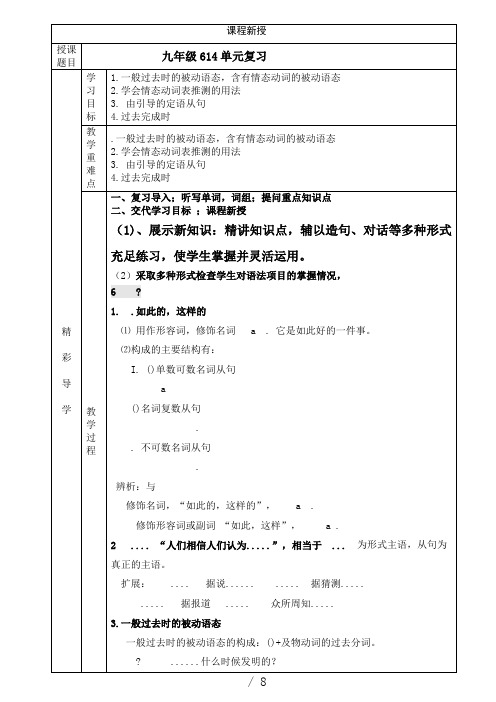
是介词,意为“除了(某人/某事)之外”,表示所说的不包括在内。
是介词,意思是“除(某人/某事)之外(还有)”,表示所说的包括在内;也表示“除了”,相当于,往往放在,,,,以及,,,等词之后。
5.定语从句:在复合句中,修饰某一名词或代词的从句叫定语从句。
被修饰的名词或代词叫先行词,定语从句一般放在先行词的后面引导定语从句的关系词有关系代词和关系副词,常见的关系代词包括,,(宾格,所有格)等,关系副词包括,,等。
关系代词和关系副词放在先行词及定语从句之间起连接作用,同时又作定语从句的重要成分。
关系代词的用法1. 既可以用于指人,也可以用于指物。
在从句中作主语或宾语,作主语时不可省略,作宾语可省略。
.2用于指物,在句中作主语或宾语,作主语不可省略,作宾语可省略。
例如:() . (作宾语)3,用于指人,用作主语,用作宾语。
在口语中,有时可用代替,也可省略。
.注意:(1)当定语从句中含有介词,介词放在句末时,,,可省略,但介词在关系代词前时,只能用“介词”结构。
例如:.这是我们去年居住的房子。
(2)含有介词的固定动词词组中,介词不可前置,只能放在原来的位置上。
例如: . 这就是你要找的那个人。
(3)作介词的宾语时,介词不能放它的前面,只能放在从句中动词的后面。
例如: .她居住的城市非常远。
(4)关系词只能用的情况:a. 先行词被序数词或形容词最高级所修饰,或本身是序数词、基数词、形容词最高级时,只能用,而不用.例如: .b.被修饰的先行词为,,,, e,,,等不定代词时,只能用,而不用.例如:?c.先行词被,,,,,等词修饰时,只能用,而不用.例如 I .d. 先行词里同时含有人或物时,只能用,而不用.例如:I I .e.以或引导的特殊疑问句,为避免重复,只能用.例如:?f.主句是结构,修饰主语的定语从句用,而不用.例如:a .(5)关系词只能用,而不用的情况:a.先行词为,时,用,而不用.例如:’s ?b.关系代词前有介词时,一般用,而不用.例如: .五、关系副词的用法(1)指时间,其先行词表示时间,在句中作时间状语。
Unit5讲义人教版英语九年级全册
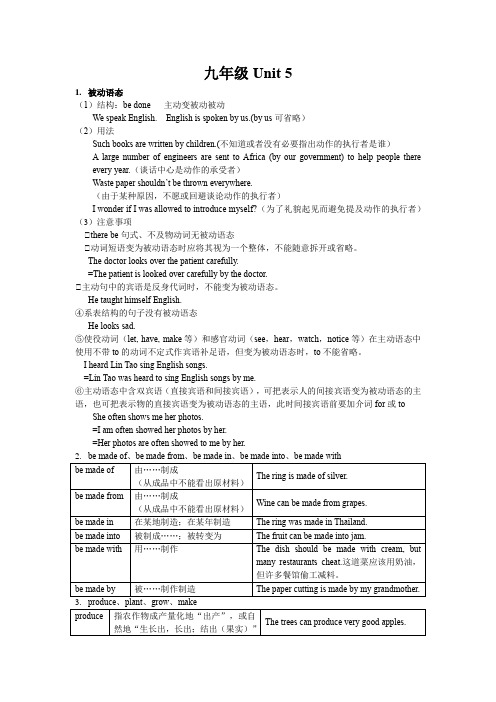
九年级Unit 51.被动语态(1)结构:be done 主动变被动被动We speak English. English is spoken by us.(by us可省略)(2)用法Such books are written by children.(不知道或者没有必要指出动作的执行者是谁)A large number of engineers are sent to Africa (by our government) to help people thereevery year.(谈话中心是动作的承受者)Waste paper shouldn’t be thrown everywhere.(由于某种原因,不愿或回避谈论动作的执行者)I wonder if I was allowed to introduce myself?(为了礼貌起见而避免提及动作的执行者)(3)注意事项①there be句式、不及物动词无被动语态①动词短语变为被动语态时应将其视为一个整体,不能随意拆开或省略。
The doctor looks over the patient carefully.=The patient is looked over carefully by the doctor.①主动句中的宾语是反身代词时,不能变为被动语态。
He taught himself English.④系表结构的句子没有被动语态He looks sad.⑤使役动词(let, have, make等)和感官动词(see,hear,watch,notice等)在主动语态中使用不带to的动词不定式作宾语补足语,但变为被动语态时,to不能省略。
I heard Lin Tao sing English songs.=Lin Tao was heard to sing English songs by me.⑥主动语态中含双宾语(直接宾语和间接宾语),可把表示人的间接宾语变为被动语态的主语,也可把表示物的直接宾语变为被动语态的主语,此时间接宾语前要加介词for或to She often shows me her photos.=I am often showed her photos by her.=Her photos are often showed to me by her.avoid sth/doing sthThe man is so cruel. You should try your best to avoid.Drivers should be careful to avoid some accidents.9.traffic un.____________________,常用heavy,much,a lot of,lots of修饰The traffic is heavy in rush hours.There is always a lot of traffic at this time of a day.traffic lights_____________ traffic jam_________________traffic rules____________ traffic accidents____________10.riserise v.__________,其过去式为________,过去分词为_________The sun rises in the east and sets in the west.12.be famous for______________ be famous as____________be famous to_________________be good for________________ no matter______________ even though__________________ traffic accident_____________ turn...into______________ go on a vacation______________ send out__________________ at festivals_____________ in trouble____________________ rise into__________________ fairy tale_______________ cover with___________________ historical story_____________ by hand_______________ all over the world______________ be used for________________ be used as_____________ be used to do sth______________ be/get used to doing sth_______________ paper cutting_____________练习题一、根据首字母或汉语提示,填写单词。
Unit4讲义 人教版英语九年级全册
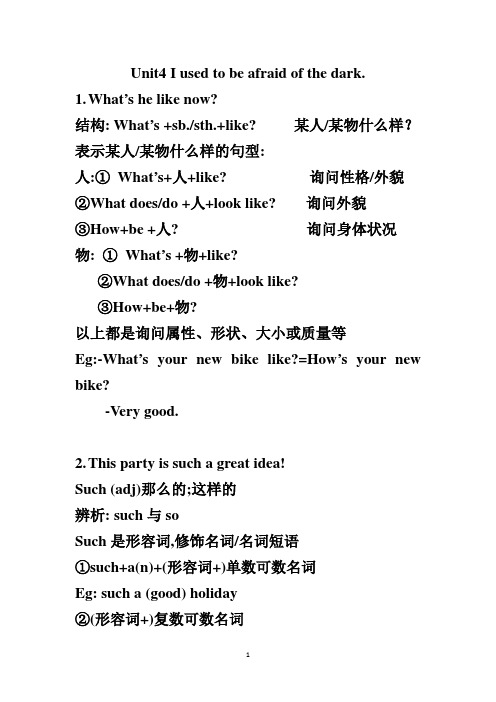
Unit4 I used to be afraid of the dark.1.What’s he like now?结构: What’s +sb./sth.+like? 某人/某物什么样?表示某人/某物什么样的句型:人:①What’s+人+like? 询问性格/外貌②What does/do +人+look like? 询问外貌③How+be +人? 询问身体状况物: ①What’s +物+like?②What does/do +物+look like?③How+be+物?以上都是询问属性、形状、大小或质量等Eg:-What’s your new bike like?=How’s your new bike?-Very good.2.This party is such a great idea!Such (adj)那么的;这样的辨析: such与soSuch是形容词,修饰名词/名词短语①such+a(n)+(形容词+)单数可数名词Eg: such a (good) holiday②(形容词+)复数可数名词Eg: such (beautiful) girls③(形容词+)不可数名词Eg: such (delicious) foodSo是副词,修饰形容词/副词Eg: so careful so carefully注意: 当名词前有many,much,few,little 等词修饰时,只能用so,不能用such.Eg: She will have so much housework to do tomorrow Such+a(n)+adj+可数名词单数=so+adj+a(n)+可数名词单数Eg:It is so interesting a book that I like it very much. It is such an interesting book that I like it very much.3.As she got better,she dared to sing in front of her class,and then for the whole school.dare (实义动词) 敢于;胆敢(可以有词形变化) Eg: I wonder how he dares to say such things.dare(情态动词) 敢(通常用于疑问句/否定句及if/whether之后,一般不用于肯定句)Eg:Dare you tell her the truth?I don’t know whether he dare try.“I dare say”习惯说法(用于肯定句) 所表示的是一种不确定的语气,常译为:很可能、大概、我想等Eg: I dare say you are right. 我想你是正确的4.Now she’s not shy anymore and loves singing in front of crowds.Not...anymore=not...any more 相当于no more(一般指行为/动作不再出现)辨析: not...any more 与not...any longernot...any more 相当于no more,表示数量和程度上的“不再”,通常修饰非延续性动词,一般指今后“不再”,故多用于将来时Eg: He will not go there any more.He will no more go there.not...any longer 相当于no longer 指时间上/距离上的“不再延长”,通常修饰延续性动词,多指现在的情况与过去相比,故常用于现在时态Eg: You can’t stay here any longer.You can no longer stay here.5.You really require a lot of talent and hard work to succeed.require (v) 需要;需求requirement (n)要求;规定用法如下:①require sb.to do sth. 要求某人做某事②require that+sb.(should) do sth. 要求某人做某事③sth. require doing /to be done.某事需要(被)做6.Only a very small number of people make it to the top.a very small number of 极少数后接复数名词(谓语动词用复数形式) a small number of 少数辨析: a number of 与the number ofa number of +复数名词许多the number of +复数名词...的数量(谓语用单数) 7.Sometimes he was absent from classes and failed his examinations.absent (adj) 缺席的;不在场的(常与from连用) be absent from 缺席absence (n) 缺席(反义词: presence )present(adj)出席的;在场的(后置定语)(adj)目前的;现在的(前置定语)fail (vt) 失败;不及格(vi) 失败;不及格~ to do sth. 未能/没能做成某事Eg: The boy didn’t fail (in) the exam.8.She advised them to talk with their son in person. advise sb. (not) to do sth. 建议某人(不)做某事advise的用法如下:①~doing sth. 建议做某事②~ that +从句建议... (that引导的从句应用虚拟语气,即:should+动原,should可以省略)advice(un) 建议;忠告 a piece of advice 一条建议9.So he became less interested in studying and missed classes.辨析: become,turn与getbecome:变得;成为(通常指身份、职位的变化,强调变化的过程已完成)Eg: She became an English teacher.turn: 变成(多用于在颜色或性质等方面的变化,强调变化的结果)Eg: The man turned blue with fear. (那个人吓得脸色发青)get:变得(多用于口语,表示一种变化过程,强调“渐渐变得”, 其后常接adj的比较级)Eg: In winter,the days get shorter.Used to的用法:used to+动原表示过去的习惯性动作或状态,现在已不再发生或不存在.否定句: used not to, usedn’t to, didn’t use toEg: She didn’t use to have long hair.She usedn’t to have long hair.一般疑问句: Did e to...? /Used sb.to...?Yes,sb.did. /Yes,ed to. No,edn’t 反意疑问句: 附加问句部分可用didn’t/usedn’t类似短语:be/get/become used to doing sth.习惯于做某事be used to do sth. 被用于做某事。
Unit1讲义 人教版英语九年级全册

Unit1 How can we become good learners?1.What about reading aloud to practice pronunciation? What about =How about Why don’t you... Why not... Would you like... Let’s...辨析: aloud,loud与loudlyaloud:(adv)大声地(与call,shout,cry等连用)(adv)出声地(与read等连用)Eg: Please read the text aloud.loud: (adj)大声的(可作定语或表语)Eg: The music is too loud.Please turn it down.(adv)响亮地;高声地(与speak,talk,sing,laugh等连用) Eg:Speak loud,please,or no one will hear you.loudly: (adv)高声地(含有喧闹的意味) (与knock,ring等连用) Eg: Suddenly the bell on the wall rang loudly.注意: ①前缀a(n)表示加强意义eg: aright正确地awake唤醒announce宣布;通告②a与名词或动词结合构成形容词/副词Eg: a+sleep (n.睡眠)=asleep (adj睡着的)a+side(n.边)=aside(adv在旁边)a+head(n.头)=ahead(adv在前面)a+live(v居住)=alive(adj活的)2.Why did Wei Fen find it difficult to learn English?此句的结构的: find it+adj+to do sth. 发现做某事...(其中it为形式宾语,真正的宾语是后面的动词不定式.句中adj为宾补)类似的结构还有:①make it+adj+to do sth. 使做某事...②think it+adj+to do sth. 认为做某事...其他几种“find+宾语+宾补”结构①find+宾语+adj 发现某人或某物Eg: She found the work very dull.②find+宾语+adv (其中副词通常是: in,out,up,down,upstairs等) Eg: I went to her house,but I found her out.③find+宾语+介词短语Eg: When he woke up,he found himself in hospital.④find+宾语+doing sth.Eg:Did you find a woman standing under the tree?⑤find+宾语+(to)do sth.Eg: I found Mary (to) clean the classroom.3.I was afraid to ask questions because of my poor pronunciation.辨析: be afraid to do sth.与be afraid of doing sth.be afraid to do sth. 害怕做某事. 根据经验或常识不敢去做某事,或没有勇气去做某事.Eg: He was afraid to go out at night.be afraid of doing sth. 表示担心会发生某事或某情况(但实际上未必会发生),或不敢做某事(指缺乏勇气或因害怕其后果而不敢)Eg: She was afraid of waking up her husband,for he was ill.4.Although I could not understand everything the characters said,... although (conj) 即使;纵然;虽然相当于though,两者可通用(用来引导让步状语从句,既可以位于主句之前,也可以位于主句之后)辨析: although与though①用作连词,表示“虽然”二者可互换,但although与though 更加正式.在同一个句子中,although与though不能与but连用,但可以与yet 连用.Eg: Although he was tired,he went on working.②Although一般不用作adv,而though可作adv,且一般位于句末,译为:可是;不过.Eg: It’s hard work;I enjoy it,though.③as though(好像;仿佛),even though(即使;纵然)等固定短语中。
人教版英语九年级全册Unit 4-Unit 6复习课件

3. humorous adj. 有幽默感的,滑稽有趣的 变形: humor n.幽默
4.silent adj. 不说话的,沉默的 remain/stay/keep silent 保持沉默 in silence 安静地,无声地=silently n.silence 5.helpful adj.有用的,有帮助的,乐于助人的 be helpful to sb. 对某人有帮助
6.general adj.总的/普遍的/常规的 n. 将军---generally adv.一般地/普遍地 in general =generally speaking 一般来说
7.introduction n.介绍 brief introduction 简介 make an introduction 做介绍 introduce oneself自我介绍 introduce A to B 把A介绍给B
14. in the last /past +时间段 在过去的...里 15. be there for 随叫随到;不离……左右
U5背诵知识点
• chopsticks [ˈtʃɒpstɪks] n. 筷子 two pairs of chopsticks • coin [kɔɪn] n.硬币 corner n.角落 • fork [fɔ:k] n.餐叉 a knife and fork 一副刀叉(做主谓单) • a knife and a fork 一把刀和一个叉(做主谓复) • blouse [blaʊz] n.(女士)短上衣;衬衫 • silver [ˈsɪlvə] n. 银,银器; adj.银色的 silver hair银发 gold金 • glass [glɑːs] n.玻璃 玻璃杯 a piece of glass a glass of一杯.. • 眼镜 a pair of glasses • cotton [ˈkɒtn] n.棉;棉花不可数,mutton 羊肉不可数 • fair [feər] n. 展览会;交易会 • environmental [ɪnˏvaɪərənˈmentl] adj. 自然环境的;有关环境的
Unit9课堂讲义 人教版英语九年级全册++
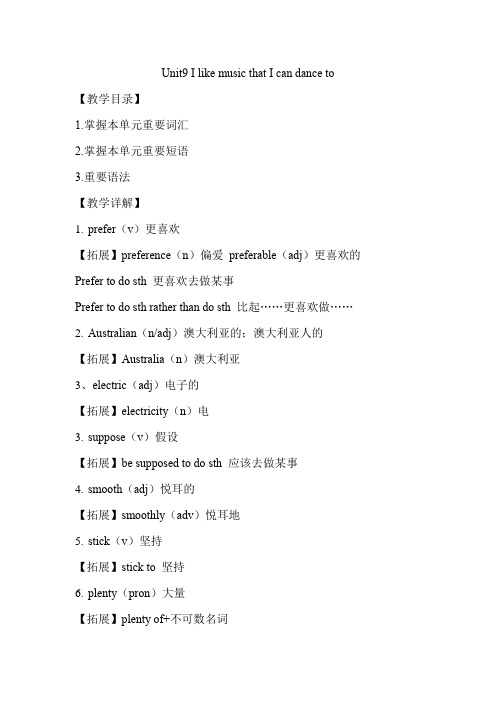
A.strangeB.intelligent
C.smoothD.common
2.—A new cartoon will be on this weekend. Would you like to go with me?
4.smooth(adj)悦耳的
【拓展】smoothly(adv)悦耳地
5.stick(v)坚持
【拓展】stick to坚持
6.plenty(pron)大量
【拓展】plenty of+不可数名词
7.sadness(n)伤心
【拓展】sad(adj)伤心的
8.pain(n)痛苦
【拓展】painful(adj)痛苦的
4.Hey, I'm the news(direct) at Beijing Radio Station.
5.Kevin is(interest) in stamp collection.
6.Flu is a(pain) illness which will last a long time.
A.write; makeB.to write; make
C.to write; to makeD.write; to make
9.—I'm sorry that I can't tell you the way to the bookstore, for I'm new here, sir.
—__________, I'll have to ask the policeman for help.
(完整版)人教版新目标九年级全册英语复习资料

九年全册英复料◆unit1 How do you study for a test?一.复重点1.目言: talk about how to study,2.要求背部分 P3G ,P4-3a, P6-3a, P8-reading3.背表。
1. 4.复教材所有内容,复所做的,侧重基目。
二.知点:1.frustrate,frustrating,frustrated : frustrate 意思“使绝望,使沮,使” ,是及物,后来接; frustrating 意思“令人沮的,令人绝望的”。
是指某事令人绝望,含有主意,主一般物; frustrated 意思“沮的,绝望的”。
是指某物感觉绝望,相当于 disappointed,含有被意,主一般人。
短 be frustrated in 意思“遭到失”。
2.介 by , with, in , on 表方式 : by+交通工具(注意不冠),by+doing sth 通⋯方式;with+ 工具,with a pen, with+人体部位, with our eyes;in +言,in English, in+物资料, in ink (墨水) =by pen;on+器或媒介 on TV3.Ever 的用法:ever 相当于 at any time,意思“曾”。
同always,反never.常于在达成的一般疑句及条件状从句,其余状况下也有所使用。
1)用于在达成的一般疑句中。
Have you ever been to Shanghai? )2用于条件状从句。
If you ever hear from her, please tell me about it.3)用于一般在的疑句中。
Do you ever talk to your English friends?4)用于否认句。
No man ever returned from here.5)用于必定句中,表示“经常,是” ,常使用 always.注意: ever 和 always 的反都是 never。
Unit11复习讲义2023-2024学年人教版九年级英语全册
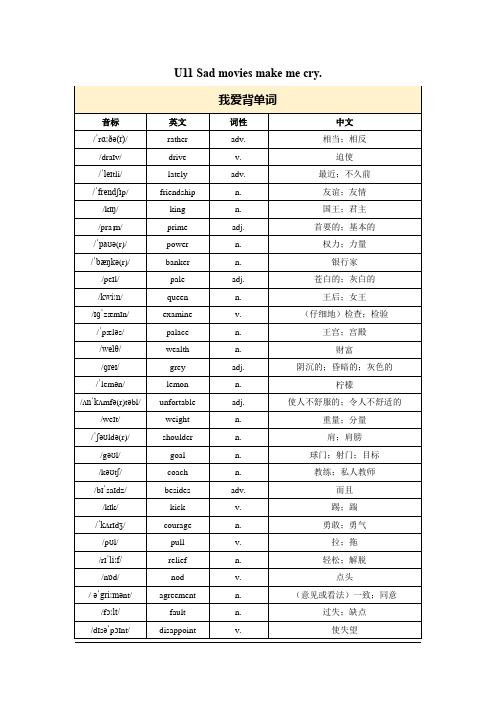
U11 Sad movies make me cry.我爱背短用would rather宁愿drive sb. crazy/mad使人发疯/发狂the more...the more...越......越......be friends with sb.成为某人的朋友leave out忽略;不提及;不包括prime minister首相;大臣call in召来;叫来neither...nor既不......也不......to start with起初;开始时let...down使失望kick sb. off 开除某人be hard on sb.对某人苛刻;对某人要求严厉rather than而不是pull together齐心协力;通力合作have...in mon 在......有共同点feel like doing sth. 想要做某事be worried about 担心;担忧take one’s position代替某人clean up 打扫search for 搜寻;寻找return to 返回continue to do sth. 继续做某事to one’s surprise另某人惊讶;出乎某人意料be asked to do sth. 被要求做某事as usual 像往常一样get into a fight with sb. 和某人打架put pressure on sb. 给某人施加压力我爱背句子1.The loud music makes me nervous. 大声的音乐使我感到紧张。
2.Money and fame don’t always make people happy. 钱和名声并不总是使人开心。
我爱做练习一.用所给单词的适当形式填空1. She (nod) to me when she passed by me in the street.2. Macello Lippi and Fabio Capello are famous football (coach) in the world.3. “You are in (agree) with someone.” means “You have the same opinion as someone does.”4. Tom often makes his sister (cry). But yesterday he was made (cry) by his sister.5. Our teacher advises us (study) hard.6. He doesn’t feel like (eat) anything now.7. My parents told me (not waste) money.8. His father is a (bank), and his mother is a music teacher.9. He felt (fortable) because of possible danger or trouble.10. The (weigh) of all these things together was 150 pounds.11. When things go wrong, all of us naturally feel (disappoint).12. It’s said that Ma Yun is one of the (wealth) businessmen in the world.13. I value my (friend) with my classmates.14. Have you been to Wuxi (late)?二.单项选择1. Seeing their teacher ________ into the classroom, they stopped ________ at once.A. walk; tellingB. entering; to speakC. enter; to tellD. walking; talking2. I tried two bookshops for the dictionary I wanted, but ________ of them had it.A. eitherB. bothC. neitherD. none3. Daniel has tried to lose ________ by eating less recently, but two kilos has been put on instead.A. weightB. weightsC. heightD. heights4. Neither Jack nor his deskmate ________ from Canada. Both of them ________ from Australia.A. is; isB. is; areC. are; areD. are; is5. “How much do you ________ ?” means “What’s your ________ ?”A. weigh; weighB. weigh; weightC. weight; weightD. weight; weigh6. —Driving less and walking more is good for our health.—So I’d rather ________ an hour’s walk to work than consider ________ a car.A. take; driveB. take; to driveC. take; drivingD. taking; driving7. Every day his parents make him ________ on the farm.A. to workB. workingC. workD. works8. —I think Chinese parents are too hard ________ young children.—I agree with you.A. forB. withC. onD. to9. —My teachers often encourage me ________ more friends but I find it difficult.—Your teachers’ idea is right. The more friends you make, ________ you will be.A. to make; the more happyB. to make; happierC. making; the happierD. to make; the happier10. —Let’s play football on the playground.—It’s too hot outside. I would rather ________ at home than ________ out.A. to stay; goB. staying; goingC. stay; to goD. stay; go三.短文填空Blowing sugar figurines is a traditional folk (民间) art in China. It has a 81./ˈhɪstri/ of over 600 years and has been listed as a statelevel intangible cultural heritage (国家级非文化物质遗产).Xiong, 34, has been blowing sugar figurines (吹糖人) 82. over twenty years. When he blows a lifelike tiger out of sugar in just minutes, kids look at him in 83. /səˈpraɪz/ thinking he is a magician.Every morning, Xiong prepares the sugar and drives to different markets in Nanchang to start his magic 84. /ʃəʊ/.He heats the sugar, pulls off a little to make a ball and blows it into different 85. (shape)—a rabbit, a monkey, and even Bing Dwen Dwen, the mascot of the Beijing 2022 Winter Olympics.People, especially little kids, are 86. (interest) in his skills. To draw more young people closer to the art, he also stops by colleges.Many college students have been drawn to the art, waiting in line for handson experience. Simon, a foreign student, is one of 87. (they). He couldn’t help having a try. 88.it looked easy, he found it difficult to make it. Thanks to Xiong’s help, Simon finally saw a horse slowly taking shape.Simon was 89. (deep) moved after learning about the art. “I just can’t believe the traditional folk art can be kept so well here. I love it. Chinese culture should be 90.(spread) around the world.” he said.This art has been passed down for four generations (代) in Xiong’s family. “We will pass on the intangible heritage.” said Xiong.。
人教版英语九年级全册Unit9复习课件

e.g. He went to see them once in a while. 他偶尔去探望他们。
12.I sensed a strong sadness and pain. 1) sense v. 感觉到, 意识到
3.marry娶;嫁;结婚;和...结婚 marry sb. / get married 表示动作 例. He married a pretty girl. She married a soldier. =She got married to a soldier. They got married last year.
人有五种感觉:视觉,听觉,嗅觉,味觉和 触觉。
2) sadness n. 悲哀
e.g. Don't give yourself up to sadness, there's still hope! 不要太悲伤,还有希望!
ness是个名词后缀,一些形容词后加ness可变成名词,如:
happy—happiness kind--kindness sad adj. 悲伤的,忧愁的 e.g. She sang a sad song. 她唱着悲伤的歌。 3) pain n. 疼痛,努力
e.g. It is unnecessary to look up every word you don’t know in the dictionary while
your are reading. 阅读时,碰到生词,不必都要在词典中查阅。 I looked up and saw him. 我抬起头来看见了他。
2022人教版九年级英语unit7--8单元重难点复习+同步测试无答案
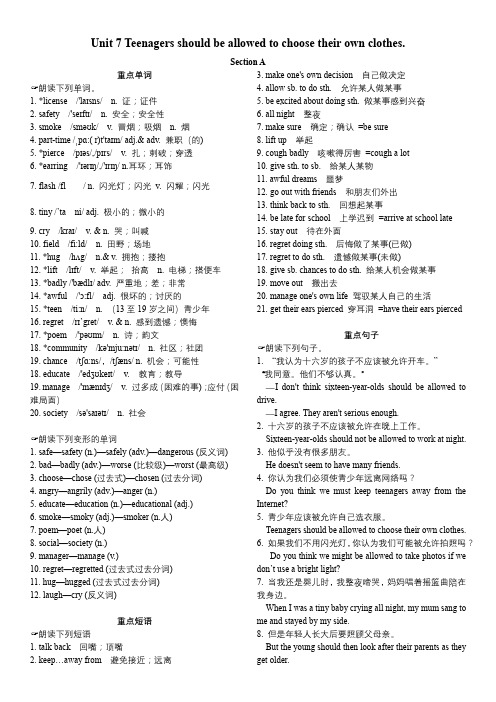
Unit 7 Teenagers should be allowed to choose their own clothes.Section A重点单词✍朗读下列单词。
1. *license /'laɪsns/ n. 证;证件2. safety /'seɪftɪ/ n. 安全;安全性3. smoke /sməʊk/ v. 冒烟;吸烟n. 烟4. part-time /ˌpɑ:( r)t'taɪm/ adj.& adv. 兼职(的)5. *pierce /pɪəs/,/pɪrs/ v. 扎;刺破;穿透6. *earring /'ɪərɪŋ/,/'ɪrɪŋ/ n.耳环;耳饰7. flash /fl/ n. 闪光灯;闪光v. 闪耀;闪光8. tiny /’ta ni/ adj. 极小的;微小的9. cry /kraɪ/ v. & n. 哭;叫喊10. field /fi:ld/ n. 田野;场地11. *hug /hʌg/ n.& v. 拥抱;搂抱12. *lift /lɪft/ v. 举起;抬高n. 电梯;搭便车13. *badly /'bædlɪ/ adv. 严重地;差;非常14. *awful /'ɔ:fl/ adj. 很坏的;讨厌的15. *teen /ti:n/ n. (13至19岁之间)青少年16. regret /rɪ’gret/ v. & n. 感到遗憾;懊悔17. *poem /'pəʊɪm/ n. 诗;韵文18. *community /kə'mju:nətɪ/ n. 社区;社团19. chance /tʃɑ:ns/,/tʃæns/ n. 机会;可能性18. educate /'edʒʊkeɪt/ v. 教育;教导19. manage /'mænɪdʒ/ v. 过多成(困难的事);应付(困难局面)20. society /sə'saɪətɪ/ n. 社会✍朗读下列变形的单词1. safe—safety (n.)—safely (adv.)—dangerous (反义词)2. bad—badly (adv.)—worse (比较级)—worst (最高级)3. choose—chose (过去式)—chosen (过去分词)4. angry—angrily (adv.)—anger (n.)5. educate—education (n.)—educational (adj.)6. smoke—smoky (adj.)—smoker (n.人)7. poem—poet (n.人)8. social—society (n.)9. manager—manage (v.)10. regret—regretted (过去式过去分词)11. hug—hugged (过去式过去分词)12. laugh—cry (反义词)重点短语✍朗读下列短语1. talk back回嘴;顶嘴2. keep…away from避免接近;远离3. make one's own decision自己做决定4. allow sb. to do sth.允许某人做某事5. be excited about doing sth. 做某事感到兴奋6. all night整夜7. make sure确定;确认=be sure8. lift up举起9. cough badly咳嗽得厉害=cough a lot10. give sth. to sb.给某人某物11. awful dreams噩梦12. go out with friends和朋友们外出13. think back to sth.回想起某事14. be late for school上学迟到=arrive at school late15. stay out待在外面16. regret doing sth.后悔做了某事(已做)17. regret to do sth.遗憾做某事(未做)18. give sb. chances to do sth. 给某人机会做某事19. move out搬出去20. manage one's own life 驾驭某人自己的生活21. get their ears pierced 穿耳洞=have their ears pierced重点句子✍朗读下列句子。
2020人教版英语九年级中考复习被动语态复习学案设计(无答案)
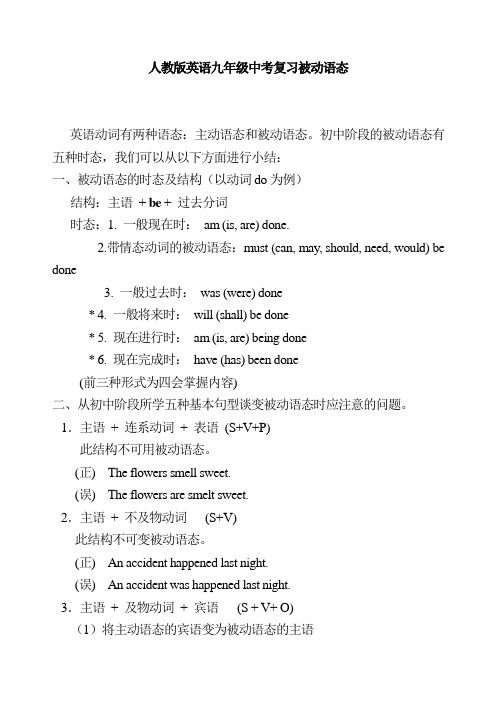
人教版英语九年级中考复习被动语态英语动词有两种语态:主动语态和被动语态。
初中阶段的被动语态有五种时态,我们可以从以下方面进行小结:一、被动语态的时态及结构(以动词do为例)结构:主语+ be + 过去分词时态:1. 一般现在时:am (is, are) done.2.带情态动词的被动语态:must (can, may, should, need, would) be done3. 一般过去时:was (were) done* 4. 一般将来时:will (shall) be done* 5. 现在进行时:am (is, are) being done* 6. 现在完成时:have (has) been done(前三种形式为四会掌握内容)二、从初中阶段所学五种基本句型谈变被动语态时应注意的问题。
1.主语+ 连系动词+ 表语(S+V+P)此结构不可用被动语态。
(正) The flowers smell sweet.(误) The flowers are smelt sweet.2.主语+ 不及物动词(S+V)此结构不可变被动语态。
(正) An accident happened last night.(误) An accident was happened last night.3.主语+ 及物动词+ 宾语(S + V+ O)(1)将主动语态的宾语变为被动语态的主语Children often sing this songThis song is often sung by children.(2)将含有介词或副词的动词短语变为被动结构时,不可将介词或副词去掉。
We should listen to the teachers carefully.The teachers should be listened to carefully.4.主语+ 及物动词+ 间接宾语+ 直接宾语(S + V+ IO+ DO)(1).将表人的间接宾语变为主语,直接宾语不变。
人教版英语九年级复习讲义无答案
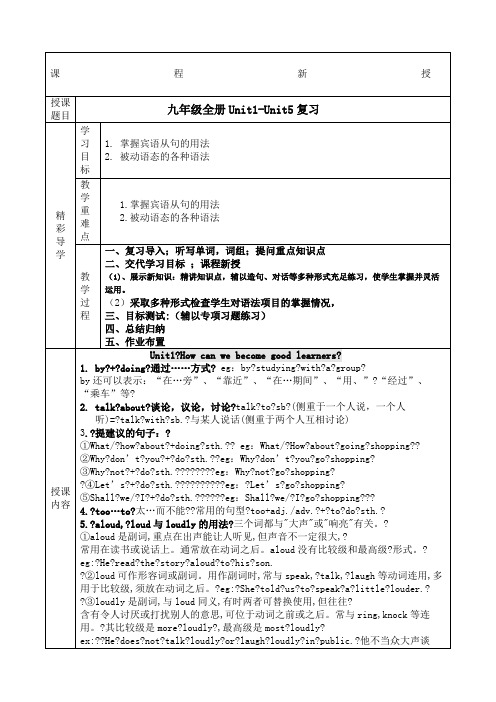
2)、由what , when , where, which, who, how ,why等连接代词或连接副词引导。
(特殊疑问句)Do you know where he lives3)、由连词whether或if引导(口语中常用if)。
(一般疑问句)Could you tell me if it snows in Australia?应注意的几个问题:1.宾语从句可放在形容词后。
常用形式是be+形容词+宾语从句I am glad you like it .2、宾语从句与主句时态的一致。
1)主句是现在(或将来)时态时,宾语从句可根据实际需要用不同的时态。
如:He says Mary is playing with the cat .He says Mary often plays with the cat.He says Mary will play with the cat.I think he left yesterday morning.2)主句时态是一般过去时,从句要用过去时态的某种形式。
He said Mary was playing with the cat.He said he hoped to be back soon..3)当从句所表示的是客观事实或客观真理时,该从句都用一般现在时,不用过去时。
如:He said light travels much faster than sound.3、宾语从句中的否定转移。
如果主句谓语动词是think , believe suppose 等,而从句的意思是否定的,这时主句的谓语动词用否定式,从句用肯定式。
如:I don’t think you are right.我认为你不对。
4、将普通的特殊疑问句变成宾语从句时,从句的语序要由疑问句变成陈述句的语序。
When will the meeting begin?I want to know when the meeting will begin.5、将普通的一般疑问句变成宾语从句时,则用if /whether连接,同时变成陈述句语序。
人教版九年级英语下册讲义

人教版九年级英语下册讲义本文档是人教版九年级英语下册的讲义,旨在帮助同学们系统掌握本学期的英语知识。
一、单元介绍本学期英语课程共分为六个单元,分别是Unit 7: Earth's Changing Climate, Unit 8: Celebrating Chinese Festivals, Unit 9: A Healthy Lifestyle, Unit 10: A Mystery Story, Unit 11: Technology and You, Unit 12: Travel and Adventure。
每个单元都包含了词汇、语法、听力、口语和阅读等内容。
二、教学目标1. 了解地球的气候变化对人类以及生物的影响,并掌握相关词汇和表达方式。
2. 了解中国的传统节日和相关俗,培养对中国文化的兴趣。
3. 掌握与健康生活方式有关的词汇和语法,学会谈论自己的生活惯和健康问题。
4. 研究阅读和理解推理类故事,并学会运用相关的词汇和句型进行表达。
5. 探索科技对人们生活的影响,并学会运用科技词汇进行交流和讨论。
6. 学会描述旅行和冒险经历,并掌握相关的词汇和句型。
三、教学内容安排每个单元的教学内容按照以下顺序进行:1. 单词和短语的研究:通过词汇练和语境运用,帮助学生掌握新单词和短语。
2. 语法的研究:介绍新的语法知识并进行练,帮助学生运用到实际情境中。
3. 听力练:通过听力材料,培养学生的听力理解能力和语音感知。
4. 口语练:通过角色扮演和对话练,帮助学生提高口语表达能力。
5. 阅读理解练:通过阅读材料,培养学生的阅读理解能力和批判性思维能力。
6. 写作练:通过写作任务,让学生运用所学知识进行写作。
四、教学方法本讲义采用多种教学方法,包括课堂教学、小组合作研究、角色扮演、演讲和讨论等,通过活动和互动培养学生的研究兴趣和综合能力。
五、教学评估每个单元结束后,将进行综合评估,包括听力测试、口语表达、阅读理解和写作任务等,旨在帮助学生巩固所学知识和提高研究成绩。
无答案人教版新目标英语九年级全册单元知识点及配套练习(K12教育文档)

无答案人教版新目标英语九年级全册单元知识点及配套练习(word版可编辑修改)编辑整理:尊敬的读者朋友们:这里是精品文档编辑中心,本文档内容是由我和我的同事精心编辑整理后发布的,发布之前我们对文中内容进行仔细校对,但是难免会有疏漏的地方,但是任然希望(无答案人教版新目标英语九年级全册单元知识点及配套练习(word版可编辑修改))的内容能够给您的工作和学习带来便利。
同时也真诚的希望收到您的建议和反馈,这将是我们进步的源泉,前进的动力。
本文可编辑可修改,如果觉得对您有帮助请收藏以便随时查阅,最后祝您生活愉快业绩进步,以下为无答案人教版新目标英语九年级全册单元知识点及配套练习(word版可编辑修改)的全部内容。
新目标九年级英语单元知识点梳理及配套练习Unit 1 How do you study for a test?1、一般现在时(特别是单数第三人称作主语);2、动词作主语的形式(现在分词和不定式);3、介词后面的动词形式(~ing);4、What about+~ing;How about+~ing;5、too+形(副)+to(不定式);6、find+宾语+宾语补足语;7、not…at all;8、get+形容词;9、某些动词后面的动词必须用~ing;10、unless条件状语从句→if条件状语从句→…,or…(并列句);11、instead/instead of;12、listen to13、ask(sb.)for(sth.);14、for example;15、have fun(doing sth.)16、end up(with…)17、spoken English;English-speaking people (countries)18、make mistakes19.talk to(with) sb.20、why don’t you(we,they )+动词原形?=why not+动词原形?21、laugh at22、first of all23、to begin with.24、later on25、be afraid of sth.(doing)be afraid to do sth.be afraid that从句26、in class/out of class /after class27、take notes28、get an“A”in English29、(sb.)be impressed by(with)…30、have trouble doing sth.(回见15)31、look up32、make up a conversation.33、around the world.34、deal with35、stay(keep)+形容词36、go by37、decide(not)to do sth.38、主语+last(延续) for long39、regard sb.(sth.)as…/hink of sb.(sth.)as…40、complain about sth.41、compare sth to sth.(把…比作…);compare sth with sth.(把…与…进行比较)42、physical problems43、break off44、in a positive way45、study for a test46、learn a lot (in)that way47、keep an English notebook48、区别:sound,voice,noise49、区别:loud,aloud,loudly50、find sb。
Unit9复习讲义2023-2024学年人教版九年级英语全册

U9 I like music that I can dance to.我爱背短用in that case既然那样;假使那样的话stick to坚持;固守plenty of大量;充足shut off关闭;停止运转once in a while偶尔地;间或prefer doing A to doing B与做B相比更喜欢做Aprefer to do A rather than do B宁愿做A也不愿做Bprefer to do sth.宁愿做某事in total 总共;合计different kinds of不同种类的;各种各样的listen to CD听CDhave spare time 有空think about思考;考虑feel like doing想要做某事depend on依赖;依靠;取决于cheer sb. up 使某人振作try one’s best to do sth. 尽某人最大努力做某事a good way to do sth. 一种做某事的好方式in time 及时be afraid of 害怕not...anymore 不再take sb. to a concert 带某人去音乐会talk about 谈论be played on the erhu 被二胡演奏be written by sb. 被......写look up 查阅the history of ......的历史be born in 出生在be known for 因......而出名make money 挣钱get married 结婚continue to do sth. 继续做某事play on the streets 在街上演奏in this way 用这种方式by the end of 在......末尾It is a pity that 真遗憾touch the hearts of people 触动人们的心make sb. do 使某人做begin to do 开始做某事teach sb. to do sth. 教某人做某事such as/for example 例如solve problems 解决问题action movies 动作影片enjoy doing sth. 享受做某事spread joy 传播快乐for several years 很多年我爱背句子1.—What kind of music do you like? 你喜欢哪种类型的音乐?—I like music that I can dance to.我喜欢我可以跟着跳舞的音乐。
人教版英语初三UNIT9讲义+习题
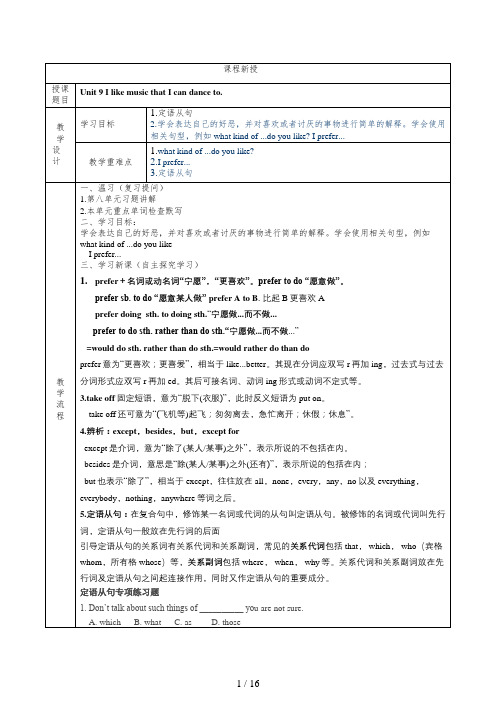
2. Is this the factory __________ you visited the other day?A. thatB. whereC. in whichD. the one3. Is this factory __________ some foreign friends visited last Friday?A. thatB. whereC. whichD. the one4. Is this the factory __________ he worked ten years ago?A. thatB. whereC. whichD. the one5. The wolves hid themselves in the places __________ couldn’t be found.A. thatB. whereC. in whichD. in that6. The freezing point is the temperature __________ water changes into ice.A. at whichB. on thatC. in whichD. of what7. This book will show you __________ can be used in other contexts..A. how you have observedB. what you have observedC. that you have observedD. how that you have observed8. The reason is __________ he is unable to operate the machine.A. becauseB. whyC. thatD. whether9. I’ll tell you __________ he told me last week.A. all whichB. thatC. all thatD. which10. That tree, __________ branches are almost bare, is very old.A. whoseB. of whichC. in whichD. on which11. I have bought the same dress __________ she is wearing.A. asB. thatC. whichD. what12. He failed in the examination, __________ made his father very angry.A. whichB. itC. thatD. what13. We’re talking about the piano and the pianist __________ were in the concert we attended last night.A. whichB. whomC. whoD. that14. The girl __________ an English song in the next room is Tom’s sister.A. who is singingB. is singingC. sangD. was singing15. Those __________ not only from books but also through practice will succeed.A. learnB. whoC. that learnsD. who learn16. Anyone __________ this opinion may speak out.A. that againstB. that againstC. who is againstD. who are against17. Didn’t you see the man __________?A. I nodded just nowB. whom I nodded just nowC. I nodded to him just nowD. I nodded to just now18. Can you lend me the novel __________ the other day?A. that you talkedB. you talked about itC. which you talked withD. you talked about19. Is there anything __________ to you?A. that is belongedB. that belongsC. that belongD. which belongs20. ---- “How do you like the book?”---- “It’s quite different from __________ I read last month.”A. thatB. whichC. the oneD. the one what21. Mr. Zhang gave the textbook to all the pupils except __________ who had already taken them.A. the onesB. onesC. someD. the others22. The train __________ she was travelling was late.A. whichB. whereC. on whichD. in that23. He has lost the key to the drawer __________ the papers are kept.A. whereB. in whichC. under whichD. which24. Antarctic __________ we know very little is covered with thick ice all the year round.A. whichB. whereC. thatD. about which25. It’s the third time __________ late this month.A. that you arrivedB. when you arrivedC. that you’ve arrivedD. when you’ve arrived26. It was in 1969 __________ the American astronaut succeeded in landing on the moon.A. thatB. whichC. whenD. in which27. May the fourth is the day __________ we Chinese people will never forget.A. whichB. whenC. on whichD. about which28. We are going to spend the Spring Festival in Guangzhou, __________ live my grandparents and some relatives.A. whichB. thatC. whoD. where29. The hotel __________ during our holidays stands by the seaside.A. we stayed atB. where we stayed atC. we stayedD. in that we stayed30. Is it in that factory __________ “Red Flag” cars are produced?A. in whichB. whereC. whichD. that31. It is the Suez Canal __________ separates Asia __________ Africa.A. which, toB. where, fromC. that, fromD. that, with32. Under the bridge, however, almost directly below, __________ was a small canoe, with a boy in it.A. thereB. whereC. itD. which33. He is not __________ a fool __________.A. such, as he is lookedB. such, as he looksC. as, as he is lookedD. so, as he looks34. Is that the reason __________ you are in favour of the proposal?A. whichB. whatC. whyD. for that35. He must be from Africa, __________ can be seen from his skin.A. thatB. asC. whoD. what36. He has two sons, __________ work as chemists.A. two of whomB. both of whomC. both of whichD. all of whom37. I, __________ your good friend, will try my best to help you out.A. who isB. who amC. that isD. what is38. He is a man of great experience, __________ much can be learned.A. whoB. thatC. from whichD. from whom39. ---- Do you know the town at all?--- No, this is the first time I __________ here.A. wasB. have beenC. cameD. am coming40. I don’t like __________ you speak to her.A. the wayB. the way in thatC. the way whichD. the way of which41. The two things __________ they felt ver y proud are Jim’s gold watch and Della’s hair.A. about whichB. of whichC. in whichD. for which42. The dinner was the most expensive meal we __________.A. would haveB. have hadC. had never hadD. had ever had43. Do you know which hotel __________?A. she is stayingB. she is staying inC. is she stayingD. is she staying in44. There is only one thing __________ I can do.A. whatB. that C . all D. which45. Who can think of a situation __________ this idiom can be used?A. whichB. thatC. whereD. in that46. I have many books, some of __________ are on chemistry.A. themB. thatC. WhichD. those47. They were interested __________ you told them.A. in whichB. in thatC. all thatD. in everything48. The astronaut did many experiments in the spaceship, __________ much help for knowing space.A. which we think it isB. which we think are ofC. of which we think isD. I think which is of49. The great day we looked forward to __________ at last.A. comeB. cameC. comingD. comes50. I like the second football match __________ was held last week.A. whichB. whoC. thatD. /6..mind doing7.provide sb. With sth.=provide sth for sb=offer sb sth=offer sth to sb关系代词的用法1. that 既可以用于指人,也可以用于指物。
人教版九年级英语总复习讲解课件

8. grammar 9. conversation
10. pronunciation
Ⅱ. 单项选择
( ) 1. —I think Paul is far from a(n) A student.
—I agree. He dislikes waiting and gets angry easily
5. One of my favorite subjects at school is
(化学).
6. Ladies in Western countries like to keep their ages a
(秘密).
7. I learn English by reading
(教科书).
8. I am weak in English
1. 向某人寻求帮助 2. 做……怎么样呢?3. 用那种方法
4. 害怕做某事
5. 爱上…… 6. 也;另外
7. 在词典中查找…… 8. 做笔记 9. 犯错误
10. 依靠;依赖
11. 有……共同点
12. 注意;关注
13.
把……和……联系起来
14. 向某人解释某事
15. 查明;找出
16. 单独地;独自
unit7
unit9 unit11
九年级英语总复习目录
Exercise1
Exercise2
unit8
Exercise3
unit1-7词汇复习1
unit1-7词汇复习2
unit1-7语法练习
unit1-7交际用语练习
Exercise1
Exercise2
unit10
Exercise3
Exercise1
17. 一点一点地
人教新目标英语初三unit9复习讲义及练习
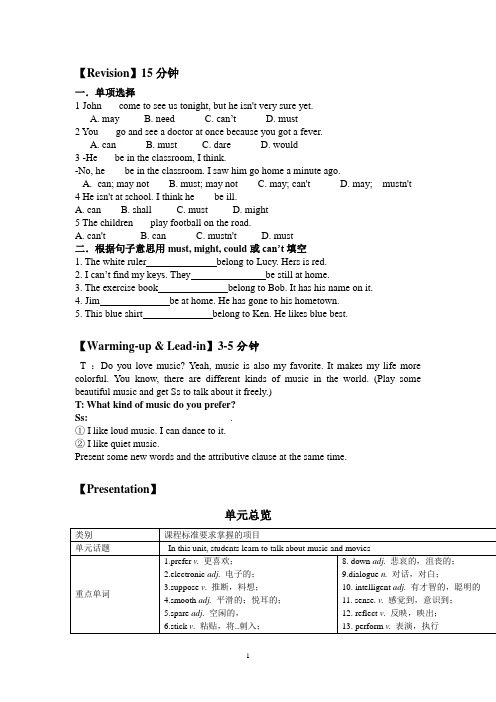
【Revision】15分钟一.单项选择1 John___ come to see us tonight, but he isn't very sure yet.A. mayB. needC. can’tD. must2 You___ go and see a doctor at once because you got a fever.A. canB. mustC. dareD. would3 -He___ be in the classroom, I think.-No, he ___ be in the classroom. I saw him go home a minute ago.A.can; may notB. must; may notC. may; can'tD. may; mustn't4 He isn't at school. I think he ___ be ill.A. canB. shallC. mustD. might5 The children___ play football on the road.A. can'tB. canC. mustn'tD. must二.根据句子意思用must, might, could或can’t填空1. The white ruler belong to Lucy. Hers is red.2. I can’t find my keys. They be still at home.3. The exercise book belong to Bob. It has his name on it.4. Jim be at home. He has gone to his hometown.5. This blue shirt belong to Ken. He likes blue best.【Warming-up & Lead-in】3-5分钟T :Do you love music? Yeah, music is also my favorite. It makes my life more colorful. You know, there are different kinds of music in the world. (Play some beautiful music and get Ss to talk about it freely.)T: What kind of music do you prefer?Ss: ____________________________.① I like loud music. I can dance to it.② I like quiet music.Present some new words and the attributive clause at the same time. 【Presentation】单元总览课文知识点详解Section A(1a)①Some students prefer chatting with their friends on the Internet to ______ (do)their homework at weekends.( )② The Smiths ___sending e-mails __letters, because it is faster.( ) ①They preferred _______in bed rather than ________horses.A. to lie , to rideB. lying, rideC. to lie ,ride( )②She prefers to eat outside rather than _______at home.A. cookB. cookingC. to cookD. cooks( )③Jim prefers tea to coffee.A. likes…less thanB. likes better …thanC. likes…better than( )④—Do you prefer grapes ________ bananas?—I prefer grapes _______ bananas.A. to, orB. or ,toC. than, to— I prefer sports shows ______ soap operas. What about you?— Me, too.A. toB. thanC. AtMany old men prefer ______ in a peaceful countryside.A. to liveB. liveingC. liveD. lived【2014 浙江丽水】— Do you often watch Man and Nature on TV?—Sometimes , It’s an interesting program, but I ____ spo rts News.C.knowD.review【拓展】在复合句中修饰名词或代词的从句叫定语从句I like music that I can dance to.music 是先行词,that是关系代词He is the man who I met yesterday.man是先行词,who是关系代词结构:人(n.) + who/that + 从句物(n.) + that/which + 从句I prefer shoes that______ cool. (be)I like a pizza that______ really delicious. (be)I love singers who ______ beautiful. (be)I have a friend who _______ sports. (play)【追踪训练】— Where is the School English Speech Contest going to be held tonight?—I’m not sure. Is it in the hall _____ can hold 300 people?A. whereB. whatC. thatD. when— In a text message, 88 means Bye-bye.—And another example is F2F______ stands for face to face.A. thatB. whoC. whomD. it33. —The TV play you who came from the stars is popular recently.— Yes,it is only the program ____ I watched this month.A. whoB. thatC. whereD. when【2014甘肃白银】38. Could you tell me the result of the discussion_____ you had made in the morning just now?C. howD. WhoShe likes singers who write their own _______ (lyric).( ) ① I play the piano and you can sing to the piano.A. along withB. withC. forD. of()②I like the music because I can sing along ______ it.A. toB. withC. forD. On3.Carmen likes musicians who play different kinds of musicBoth of Alice’s parents are _________ (music).A friend who helps you when you have trouble is a real friend.在你有困难时帮助你的朋友才是真正的朋友。
- 1、下载文档前请自行甄别文档内容的完整性,平台不提供额外的编辑、内容补充、找答案等附加服务。
- 2、"仅部分预览"的文档,不可在线预览部分如存在完整性等问题,可反馈申请退款(可完整预览的文档不适用该条件!)。
- 3、如文档侵犯您的权益,请联系客服反馈,我们会尽快为您处理(人工客服工作时间:9:00-18:30)。
课程新授授课题目九年级全册Unit1-Unit5复习精彩导学学习目标1.掌握宾语从句的用法2.被动语态的各种语法教学重难点1.掌握宾语从句的用法2.被动语态的各种语法教学过程一、复习导入;听写单词,词组;提问重点知识点二、交代学习目标;课程新授(1)、展示新知识:精讲知识点,辅以造句、对话等多种形式充足练习,使学生掌握并灵活运用。
(2)采取多种形式检查学生对语法项目的掌握情况,三、目标测试:(辅以专项习题练习)四、总结归纳五、作业布置授课内容Unit1?How can we become good learners?1.by?+?doing?通过……方式? eg:by?studying?with?a?group?by还可以表示:“在…旁”、“靠近”、“在…期间”、“用、”?“经过”、“乘车”等?2.talk?about?谈论,议论,讨论?talk?to?sb?(侧重于一个人说,一个人听)=?talk?with?sb.?与某人说话(侧重于两个人互相讨论)3.?提建议的句子:?①What/?how?about?+doing?sth.?? eg:What/?How?about?going?shopping??②Why?don’t?you?+?do?sth.??eg:Why?don’t?you?go?shopping?③Why?not?+?do?sth.????????eg:Why?not?go?shopping??④Let’s?+?do?sth.??????????eg:?Let’s?go?shopping?⑤Shall?we/?I?+?do?sth.??????eg:Shall?we/?I?go?shopping???4.?too…to?太…而不能??常用的句型?too+adj./adv.?+?to?do?sth.?5.?aloud,?loud与loudly的用法?三个词都与"大声"或"响亮"有关。
?①aloud是副词,重点在出声能让人听见,但声音不一定很大,?常用在读书或说话上。
通常放在动词之后。
aloud没有比较级和最高级?形式。
? eg:?He?read?the?story?aloud?to?his?son.?②loud可作形容词或副词。
用作副词时,常与speak,?talk,?laugh等动词连用,多用于比较级,须放在动词之后。
?eg:?She?told?us?to?speak?a?little?louder.??③loudly是副词,与loud同义,有时两者可替换使用,但往往?含有令人讨厌或打扰别人的意思,可位于动词之前或之后。
常与ring,knock等连用。
?其比较级是more?loudly?,最高级是most?loudly?ex:??He?does?not?talk?loudly?or?laugh?loudly?in?public.?他不当众大声谈笑。
?6.?not?…at?all?一点也不??根本不?7.?be?/?get?excited?about?sth.===?be?/?get?excited?about?doing?sth.?===?be?excited?to?d o?sth.?对…感兴奋?8.?①?end?up?doing?sth????终止做某事,结束做某事The?party?ended?up?singing.?②?end?up?with?sth.????以?结The?party?ended?up?with?her?singing.?9.??also?也、而且(用于肯定句)常在句子的中间?either?也(用于否定句)常在句末?too??也?(用于肯定句)???常在句末?10.?make?mistakes?犯错?make?a?mistake?犯一个错误?11.?laugh?at?sb.?笑话;取笑(某人)?12.?make?up?组成、构成?13.?one?of?+(the+?形容词最高级)+名词复数形式??…其中之一?14.?It’s?+形容词+(for或者of.?)?sb?to?do?sth.?(对于某人来说)做某事…?15.?decide?to?do?sth.?决定做某事?16.?deal?with?处理17.?worry?about?sb./?sth.?担心某人/?某事18.?be?angry?with?sb.?对某人生气?19.??see?sb.?/?sth.?doing?看见某人正在做某事?强调正在发生see?sb.?/?sth.?do????看见某人在做某事(强调经常看见)20.?regard…?as?…?把…看作为….??21.??too?many?许多?修饰可数名词?如:too?many?girls?too?much?许多?修饰不可数名词?如:too?much?milk?much?too?太??修饰形容词???如:much?too?beautiful?22.?change…?into…?将…变为…??23.?with?the?help?of?sb.?==?with?one’s?help?在某人的帮助下24.?compare?…?to?…?把…与…相比?25.??instead?代替?用在句末,副词(字面上常不译出来)?instead?of?sth.?/?doing?sth.?代替,而不是?用在句中,动词?Unit2?I think that moonkakes are delicious1.?used?to?do?sth.?过去常常做某事?(be used to doing/be used to do sth/be used as)?否定形式:?didn’t?use?to?do?sth.?/?used?not?to?do?sth.?2.?反意疑问句?①肯定陈述句+否定提问?Lily?is?a?student,?isnt?she???Lily?will?go?to?China,?won’t?she?????②否定陈述句+肯定提问??如:?She?doesn’t?come?from?China,?does?she??You?haven’t?finished?homework,?have?you?? ??③提问部分用代词而不用名词?Lily?is?a?student,?isn’t?she????④陈述句中含有否定意义的词,如:little,?few,?never,?nothing,?hardly等。
其反意疑问句用肯定式。
?如:?He?knows?little?English,?does?he??他一点也不懂英语,不是吗??They?hardly?understood?it,?did?they?他们几乎不明白,不是吗???3.?? be?interested?in sth./doing stn?对(做)…感兴趣?interested?adj.?感兴趣的,指人对某事物感兴趣,往往主语是人???interesting?adj.有趣的,指某事物/某人具有趣味,主语往往是物?4.?still?仍然,还??用在be?动词的后面?如:I’m?still?a?student.?????用在行为动词的前面?如:I?still?love?him.?5. 害怕…??be?terrified?of?sth.??如:I?am?terrified?of?the?dog.????????????be?terrified?of?doing?sth.?如:I?am?terrified?of?speaking.?6.be?worried?about?sb./sth.?担心某人/某事?worried?是形容词??8.??hardly??adv.?几乎不、没有??????hardly?ever??很少???? ?hardly?修饰动词时,通常放在助动词、情态动词之后,实义?动词之前?助动词/情态动词+hardly???????????hardly?+?实义动词??如:???I?can?hardly?understand?them.??? I?hardly?have?time?to?do?it.。
9.?in?the?last?few?years.?在过去的几年内?常与完成时连用?如:?????I?have?lived?in?China?in?the?last?few?years.??10.?be?different?from?与…不同??(反义词?)11.??make?sb./?sth.?+?形容词??make?you?happy?????make?sb./?sth.?+?动词原形??make?him?laugh?13.??help?sb.?with?sth.?帮某人某事???help?sb.?(to?)?do?sth.?帮某人做某事???14.?fifteen-year-old?作形容词?15岁的????fifteen-year-olds?作名词指15岁的人???fifteen?years?old?指年龄?15岁??15.支付不起…??can’t?/couldn’t?afford?to?do?sth.??????????? ?can’t?/?couldn’t?afford?sth.????16.?as?+?形容词./副词+as?sb.?could/can?尽某人的…能力?17.?get?into?trouble?with?遇到麻烦??18.?make?a?decision?下决定?下决心??19.?to?one’s?surprise?令某人惊讶?20.?take?pride?in?sth.?以…而自豪?21.?pay?attention?to?sth.?对…注意,留心?22.?give?up?doing?sth.?放弃做某事?23.不再??①no?more?==?no?longer?如I?play?tennis?no?more/?longer.?②not?…any?more?==?not?…any?longer??I?don’t?play?tennis?any?more/longer .??Unit 3 Could you please tell me where the restrooms are1. not…until… You never know until you try something。
2. suggest作动词,意为“建议;提议”;名词形式是________________3.advice(可数/不可数,n/v?)3. come on快点同义短语:be quick, hurry up。
